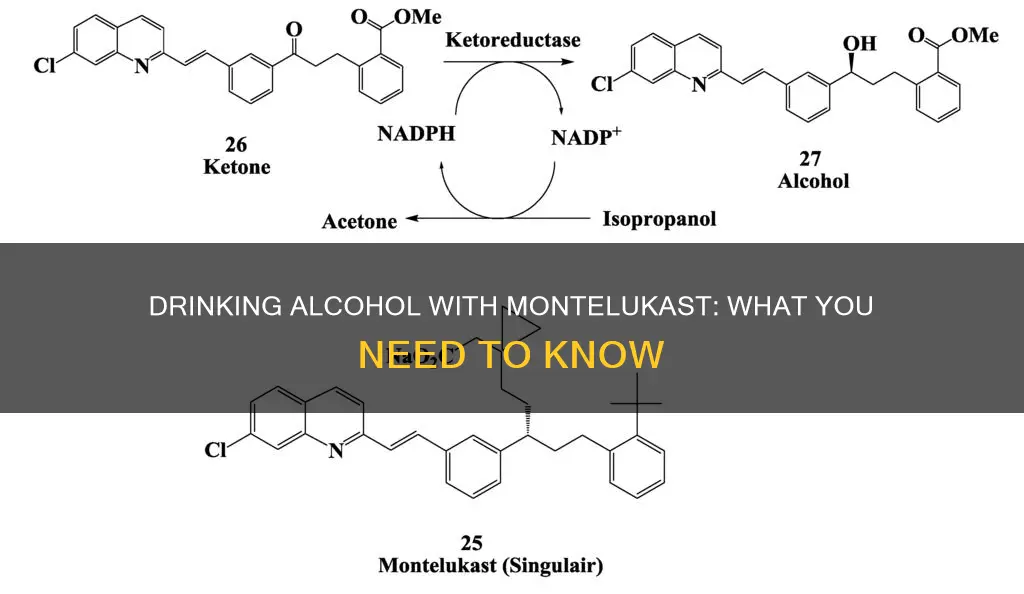
Montelukast is a medication used to treat asthma and allergies. It is a leukotriene receptor antagonist that works by blocking the action of leukotrienes, which are chemicals that contribute to inflammation and the narrowing of airways. While there are no specific studies on the interaction between montelukast and alcohol, it is generally advised to avoid drinking alcohol while taking medication. This is because alcohol can potentially interfere with the effectiveness of medications and increase the risk of side effects. In this article, we will explore whether it is safe to consume alcohol while taking montelukast and discuss the potential risks and dangers of mixing the two.
| Characteristics | Values |
|---|---|
| Can you drink alcohol while taking Montelukast? | There is no direct interaction between Montelukast and alcohol. However, it is generally advised to avoid drinking alcohol while taking the medication. Alcohol can worsen certain side effects of Montelukast, such as dizziness or drowsiness. |
| Potential side effects of combining alcohol and Montelukast | Increased risk of drowsiness, dizziness, or lack of coordination. Alcohol can also exacerbate certain side effects of Montelukast, such as headaches or stomach pain. |
| Risks of combining alcohol and Montelukast | Excessive alcohol consumption can weaken the immune system, making it harder for the body to fight infections and exacerbating respiratory symptoms. Heavy drinking is also linked to liver damage and other serious health issues. |
| Medical opinions on mixing alcohol with Montelukast | Healthcare providers generally advise against drinking alcohol while taking Montelukast. While moderate drinking may not pose significant risks for everyone, abstaining from alcohol ensures the medication's effectiveness and minimises potential interactions or side effects. |
| Pharmacists' perspectives | Pharmacists advise against mixing alcohol with Montelukast due to the lack of specific research on the topic. |
What You'll Learn

Montelukast and alcohol can both cause dizziness
Montelukast is a medication used to treat asthma and allergies. It is known to have some side effects, including dizziness, drowsiness, and upset stomach. While it is not known to directly interact with alcohol, consuming both simultaneously may worsen these side effects.
Montelukast belongs to a group of medicines called leukotriene receptor antagonists (LTRAs). It works by blocking leukotrienes, which are chemicals in the body that cause inflammation and the narrowing of airways. By inhibiting the action of leukotrienes, montelukast helps to alleviate symptoms such as wheezing, coughing, and shortness of breath.
Although montelukast and alcohol do not exhibit a direct interaction, combining them may lead to enhanced side effects. Montelukast is known to cause dizziness and drowsiness in some individuals. Similarly, alcohol consumption can induce comparable effects. When consumed together, the intensity of these side effects may be amplified.
Additionally, both montelukast and alcohol can cause upset stomach and liver damage. Consuming them simultaneously may increase the risk of liver injury. However, it is important to note that the risk of liver damage from combining montelukast and alcohol has not been extensively studied.
The decision to consume alcohol while taking montelukast should be made in consultation with a healthcare provider. While there may not be a direct interaction, the potential for amplified side effects exists. Healthcare providers generally advise avoiding alcohol while taking medications like montelukast to ensure the medication's effectiveness and minimize potential interactions or side effects.
Antibiotics and Alcohol: Is It Safe to Drink Beer?
You may want to see also

Alcohol intolerance is more likely if you have allergies or asthma
Montelukast is a medication used to treat asthma and allergies. It is a leukotriene receptor antagonist, meaning it works by blocking the action of leukotrienes, which are chemicals that contribute to inflammation and the narrowing of airways. By reducing inflammation and widening the airways, montelukast helps to improve breathing and prevent asthma attacks.
While there are no specific studies on the interaction between montelukast and alcohol, medical professionals generally advise avoiding alcohol while taking this medication. This is because alcohol can potentially interfere with the effectiveness of medications and may increase the risk of side effects. In the case of montelukast, alcohol could worsen certain side effects, such as dizziness or drowsiness.
Additionally, excessive alcohol consumption can have detrimental effects on overall health, including weakening the immune system and exacerbating respiratory symptoms. Heavy drinking has also been linked to liver damage and other serious health conditions. Therefore, it is recommended to consult a healthcare provider before consuming alcohol while taking montelukast to ensure the medication's effectiveness and minimize potential interactions or side effects.
Now, addressing the topic of alcohol intolerance and its relation to allergies and asthma:
Alcohol intolerance can cause immediate, uncomfortable reactions after consuming alcohol. It is caused by a genetic condition that impairs the body's ability to break down alcohol efficiently. While not a true allergy, certain ingredients in alcoholic beverages, such as chemicals, grains, preservatives, or histamines, can trigger intolerance reactions or allergic responses.
Risk factors for alcohol intolerance include having asthma, hay fever, or allergies. Alcoholic drinks can trigger a range of allergic and allergic-like responses, including rhinitis, itching, facial swelling, headaches, cough, and asthma. In surveys, a significant proportion of asthmatics reported triggering of allergic or allergic-like symptoms and a worsening of their asthma after consuming alcohol. Wine, in particular, has been identified as a common trigger for adverse responses, with wine-induced asthma potentially caused by sensitivity to sulfites or histamines.
If you have allergies or asthma, it is important to be aware of the potential for alcohol intolerance and the risk of triggering allergic or asthmatic reactions. The only way to prevent these reactions is to avoid alcohol or identify and avoid specific substances that cause your reactions. Labels on alcoholic beverages can help identify potential allergens or triggers, although they may not list all ingredients. Keeping an asthma journal, where you track symptoms and potential triggers, can also be helpful in identifying any connections between alcohol consumption and asthma attacks.
Beer and Pepto-Bismol: A Safe Mix?
You may want to see also

Montelukast and alcohol can both upset your stomach
Montelukast is a medication used to treat asthma and allergies. It is known to occasionally cause an upset stomach as a side effect. Alcohol consumption can also irritate the stomach lining, leading to similar stomach discomfort. Therefore, combining montelukast and alcohol may increase the likelihood and severity of stomach upset.
Montelukast belongs to a group of medicines called leukotriene receptor antagonists (LTRAs). It works by blocking leukotrienes, which are chemicals in the body that contribute to inflammation and the narrowing of airways. By reducing inflammation and widening the airways, montelukast helps alleviate symptoms such as wheezing, coughing, and shortness of breath. It is an effective treatment option for managing asthma and allergy symptoms.
While montelukast does not directly interact with alcohol, combining the two can increase the risk of certain side effects. Alcohol can potentially interfere with the effectiveness of medications and may increase the intensity of specific side effects. In the case of montelukast, alcohol may worsen side effects such as dizziness, drowsiness, and upset stomach.
Additionally, it is important to note that individuals with allergies or asthma may be more prone to developing alcohol intolerance. Symptoms of alcohol intolerance can include facial flushing, stomach upset, and a runny or stuffy nose after drinking alcohol. Therefore, consuming alcohol while taking montelukast may further increase the likelihood of experiencing stomach discomfort.
Furthermore, there is a potential risk of liver damage associated with both montelukast and alcohol consumption. While the risk of liver damage from combining the two has not been extensively studied, it is possible that drinking alcohol while taking montelukast may increase the chances of liver injury.
In conclusion, while there may not be a direct interaction between montelukast and alcohol, it is important to consider the potential for increased side effects, particularly stomach upset. The decision to consume alcohol while taking montelukast should be made in consultation with a healthcare provider, who can provide personalized advice based on individual circumstances.
Beer Drinking and Pancreatic Cancer: Is There a Link?
You may want to see also

Liver damage is a possible side effect of both
Montelukast is a medication used to treat asthma and allergies. It is a type of medication known as a leukotriene receptor antagonist, which works by blocking the action of leukotrienes, the inflammatory chemicals in the body that contribute to inflammation and the narrowing of airways. By reducing inflammation and widening the airways, montelukast helps to alleviate symptoms such as wheezing, coughing, and shortness of breath.
While montelukast and alcohol don't directly interact with each other, there are a few things to consider before consuming them together. Firstly, individuals with allergies or asthma may be more likely to develop alcohol intolerance. Symptoms of alcohol intolerance can include facial flushing, stomach upset, and a runny or stuffy nose after drinking alcohol. Therefore, drinking alcohol may cause discomfort, whether or not montelukast is being taken.
Secondly, both montelukast and alcohol can have similar side effects, including an upset stomach, dizziness, and drowsiness. These effects may be more pronounced if alcohol and montelukast are combined. Additionally, liver damage has been reported in some people taking montelukast, and alcohol is also known to cause liver damage, especially with long-term or heavy use. Although the risk of liver damage from combining alcohol and montelukast has not been extensively studied, it is possible that drinking alcohol while taking montelukast may increase this risk.
The potential for liver damage is an important consideration when deciding whether to consume alcohol while taking montelukast. While there may be no direct interaction between the two, the combination could potentially increase the risk of liver-related side effects. As always, it is essential to consult a healthcare provider before consuming alcohol with any medication, including montelukast, to ensure a comprehensive understanding of the risks involved.
Beer After Its Best: Is It Safe to Drink?
You may want to see also

Combining the two may increase the risk of liver damage
Montelukast is a medication used to treat asthma and allergies. It is known to be safe for consumption by breastfeeding women and does not affect one's ability to drive a vehicle. However, it is important to note that consuming alcohol while taking montelukast may increase the risk of liver damage.
Montelukast belongs to a group of medicines called leukotriene receptor antagonists (LTRAs). These drugs work by blocking leukotrienes, which are chemicals in the body that cause inflammation and the narrowing of airways. By inhibiting the action of leukotrienes, montelukast helps to alleviate symptoms such as wheezing, coughing, and shortness of breath, making it an effective treatment for asthma and allergies.
While montelukast and alcohol do not have a direct interaction, combining the two may increase the risk of liver damage. Alcohol is metabolised by the liver into acetaldehyde, a toxic substance. Heavy drinking or long-term alcohol use can lead to liver damage and other serious health issues. Similarly, montelukast has been associated with an increase in liver enzymes, which can indicate potential liver issues. Therefore, consuming alcohol while taking montelukast may exacerbate the risk of liver-related problems.
In addition to the potential risk of liver damage, there are other considerations when combining alcohol and montelukast. Both substances can cause similar side effects, including dizziness, drowsiness, and stomach upset. As a result, combining them may worsen these side effects. Furthermore, individuals with allergies or asthma may be more likely to develop alcohol intolerance, experiencing symptoms such as facial flushing, stomach upset, and a runny or stuffy nose after drinking alcohol.
While the exact risk of liver damage from combining alcohol and montelukast has not been extensively studied, healthcare providers generally advise avoiding alcohol while taking this medication. This is to ensure the effectiveness of the medication and minimise the potential for adverse effects or interactions. It is important for individuals taking montelukast to consult their healthcare provider for personalised advice regarding alcohol consumption, as the response to medications and alcohol can vary from person to person.
Beer Consumption and LDL Levels: A Concerning Link
You may want to see also
Frequently asked questions
While there is no known direct interaction between montelukast and alcohol, it is generally advised to avoid drinking alcohol while taking this medication. Alcohol can worsen certain side effects of montelukast, such as dizziness or drowsiness, and may also increase the risk of liver damage. It is recommended to consult your healthcare provider to determine if it is safe for you to consume alcohol while taking this medication.
Drinking alcohol while taking montelukast may increase the risk of experiencing side effects such as dizziness, drowsiness, or lack of coordination. These side effects can impair your ability to drive or operate machinery. Additionally, alcohol can exacerbate certain side effects of montelukast, including headaches or stomach pain.
Combining alcohol with montelukast may increase the risk of liver damage, as both substances can negatively affect the liver, especially with long-term or heavy use. Excessive alcohol consumption can also weaken the immune system, making it more difficult for the body to fight off infections and exacerbating respiratory symptoms.
Most healthcare providers recommend avoiding alcohol while taking montelukast to ensure the medication's effectiveness and minimize potential interactions or side effects. It is essential to consult your pharmacist or healthcare provider for personalized advice based on your specific health condition and medication regimen.







